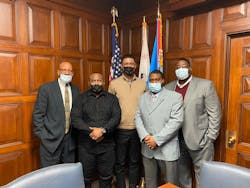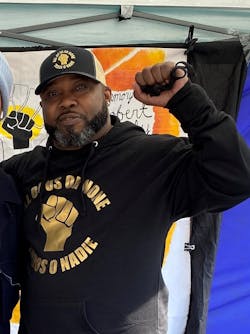A Cisco Employee’s Mission Brings Talent to Company While Supporting Communities
“If you have passion, plant a seed; you never know what will happen.”
Spoken by Mac Smith, project specialist, Diversity & Inclusion, Cisco, it’s truly an understatement of how Smith’s desire to help kids from underprivileged areas finds jobs in technology led to a company-supported program and a newly created position for him.
But let’s start at the beginning of Smith’s journey to understand how his idea became reality and how Cisco’s culture embraced Smith’s goals.
“When I realized that a typical way out of my community, being a rapper, wasn’t going to work out for me, I remember hearing about a computer lab that Shaquille O’Neal created and my dream became to learn those skills,” explains Smith. He eventually found his way to Cisco.
While he always helped his community and was awarded Mason of the Year for his work with the homeless, it was the murder of George Floyd that profoundly affected him. “When I heard the passionate speech given by Chuck Robbins, our CEO, on how he felt Cisco could help in the fight for social justice, I was very moved and knew I had to do something," said Smith.
His first step was to create small groups of fellow employees to brainstorm ideas on how to help communities, especially helping kids break the cycle of poverty by finding good jobs. He recalls a colleague saying she wanted to help and two weeks later called him to say she started a program in Chicago. “It was overwhelming, I really didn’t know what I was doing, but I had such great support from people within the company, that I expanded my reach outside of the company to groups and organizations that I thought could help,” says Smith. He sought out a wide range of organizations, including NGOs. He even approached a judge in Detroit who has now sent 10 students to Cisco’s Networking Academy to help them turn their lives around.
In 2020 he formalized his efforts within the company and co-founded Ambassadors for Change (AFC). Its mission is to provide at-risk youth and rehabilitated adults access to an education in IT skills through the Academy.
A Supporting Culture
“In creating this program, I had a great support system,” says Smith. “There were so many people at the company who were passionate about seeing changes, and our group is particularly resourceful and supplied so many connections.”
“We have a culture here of giving back and community engagement is a core value of who we are,” he explains. “We hear this message of giving back from our CEO, from all senior leadership and we put our money where our mouth is.”
Each year every employee is given two weeks of paid time off to engage in community activities of their choice. And with 80,000 employees globally that’s quite an undertaking. Participation is high with 80% of the workplace involved in programs, and the rate of the DX team was 90%. Additionally, the company will match employees’ charitable contributions, which resulted in the company providing $34 million to organizations.
Building a giving-back culture that is this strong takes some time. While it has always been in the DNA of the company, Carothers, notes, about five years ago it was formalized. “We put a stake in the ground and said we wanted to positively impact 1 billion lives, within 10 years.” To ensure progress the company audits the numbers and provides Impact reports.
“What is most important in all of this is that Cisco has created a fertile ground, that lets people like Smith bloom,” notes Carothers. Given that attitude, it’s not surprising that a few months ago a job was creating specifically for Smith so that he could focus his efforts entirely in this area. In this job, he leads all global giveback efforts for the DX group which numbers 350. Smith is overseeing efforts across the U.S., which include programs such as CHAMP that provides African American and Latino youth with life skills, and Second Chance, which focuses on providing a second chance to non-violent youth. Smith is also overseeing give-back programs globally as AFC has programs underway in Ghana, Morocco, Thailand and Japan.
In this new role, a typical day can look like this:
• Second Chance Initiative: Advancing the program in key cities; monitoring the progress of participants in Chicago and Detroit; working with teachers, judges, and other stakeholders to provide a second chance to non-violent offenders – through a certificate program with Cisco’s Networking Academy.
• Everyday Mentoring: For Second Chance participants and others.
• Rebuilding Lives: Oakland, Calif., technology education program for middle-aged men and women needing to rebuild their lives after incarceration.
• Local work: Stockton, Calif. -- Just getting started and is engaging community stakeholders.
• Ghana outreach: Counseling young men and women in Ghana by phone about tech skills and certificate programs that will enable them to work remotely in the future and break the cycle of poverty in their families.
A Continual Journey
A large part of why Smith has been so successful in creating such a strong organization is that he understands how to approach students who are looking to build careers. “We need to speak in simple terms and understand that people have different backgrounds and expectations. For example, most inner-city schools don’t have robotic programs so students aren't aware of STEM careers. We need to expose kids to all the options available to them, starting at a young age to show them that people who look like them are in these careers.”
Smith believes that mentoring is an essential part of the success of this program and gives the example of a couple in Detroit that he has been working closely with who recently earned their Cisco Cybersecurity Analyst Certifications. “They are new parents, and this is life changing for them.”
Best Practices in Creating a Give-back Culture
Having a structure around Cisco’s giving back philosophy is the mechanism through which ideas become action. “We set the goal and then put together the resources around it,” says Carothers. “It’s important to have a staff and communicate the goals and then join with other groups to achieve the goals. And for our give-back goals, they are not tied to how we sell product so it’s a different approach.”
Once that structure is in place, it provides a home for ideas. “As Smith did, once you have an idea you seek out like-minded, passionate people in your organization. Every organization, no matter what the size, has people who have ideas on how to give back to the community. And in the current state of the workforce where people feel comfortable bringing their whole selves to the company, they feel more comfortable talking about the charitable work they do outside of the job.”
Smith agrees. “Go to your superior, talk to HR. Reach out to the community. Volunteer at local Boys & Girls Clubs to see what the community needs. Create a team of people, but they need to lead with their heart. These efforts take a lot of time and can be a struggle but there is much joy.”
Caption for cover photo-- Mac Smith (front left) engages with civic leaders to develop programs aimed at breaking the cycle of poverty. He is pictured here with Stockton Mayor Kevin Lincoln in the center. The others pictured are with My Brother’s Keeper Alliance and include William Lattimore (left-most), Aaron Edwards (second from right) and Charles Johnson (right-most).


